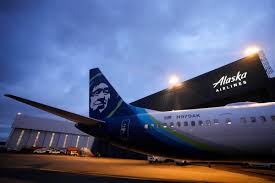The recent revelation that Boeing paid approximately $160 million in compensation to Alaska Air Group in the first quarter has underscored the significant financial impact of the temporary grounding of 737 MAX 9 jets. This compensation, intended to address lost profits resulting from the grounding, highlights the complex interplay between airlines and aircraft manufacturers in the aftermath of safety incidents and regulatory actions.
Alaska Airlines, like other carriers, faced operational disruptions and financial losses following the temporary grounding of its 737 MAX 9 fleet. The mid-air cabin panel blowout experienced by an Alaska Airlines-operated MAX 9 jet in January prompted the U.S. aviation regulator to order inspections and grounding of 171 jets, including those operated by United Airlines. This incident not only raised safety concerns but also posed logistical challenges for airlines already grappling with the effects of the COVID-19 pandemic on travel demand.
The $160 million compensation from Boeing represents a crucial lifeline for Alaska Air Group, helping to mitigate the financial strain caused by the grounding of its MAX 9 aircraft. While the payment addresses lost profits in the first quarter, Alaska Air Group anticipates additional compensation from Boeing as discussions continue between the two parties. This financial support from Boeing comes at a time when airlines are facing mounting expenses and uncertainty, making it a critical factor in their ability to navigate the ongoing challenges in the aviation industry.
However, the compensation from Boeing also raises questions about the broader implications of the MAX 9 grounding for both the aircraft manufacturer and the airlines involved. Boeing’s acknowledgment of responsibility through compensation reflects its recognition of the adverse impact of the safety incident on its customers and underscores the importance of maintaining trust and confidence in its products. Moreover, the financial repercussions of the MAX 9 grounding extend beyond Alaska Air Group to other carriers and suppliers in the aerospace ecosystem, highlighting the interconnected nature of the industry.
The compensation from Boeing serves as a reminder of the risks and uncertainties inherent in the aviation sector, where safety incidents and regulatory actions can have far-reaching consequences. While the MAX 9 grounding represents a significant setback for Boeing and its customers, it also presents an opportunity for the industry to reassess safety protocols and risk management practices to prevent similar incidents in the future. As airlines continue to navigate the aftermath of the MAX 9 grounding, collaboration between manufacturers, regulators, and operators will be essential to restoring confidence and ensuring the safety and reliability of commercial aviation.
Looking ahead, the resolution of the MAX 9 grounding and the compensation provided by Boeing offer valuable lessons for the aviation industry as it seeks to address emerging challenges and adapt to changing market dynamics. By prioritizing safety, transparency, and accountability, stakeholders can work together to build a more resilient and sustainable aviation ecosystem that safeguards the interests of passengers, employees, and shareholders alike.
The compensation from Boeing to Alaska Air Group underscores the complex dynamics at play in the aftermath of the MAX 9 grounding and highlights the critical role of financial support in helping airlines weather operational disruptions. As the aviation industry continues to grapple with the impact of safety incidents and regulatory actions, collaboration and proactive risk management will be essential in building a safer and more resilient future for commercial aviation.
